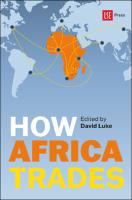How Africa Trades
Contributor(s)
Luke, David (editor)
Language
EnglishAbstract
Trade is an essential driver of economic transformation, growth, and prosperity. At a time of global uncertainty and policy fluidity, this comprehensive volume demystifies African trade and trade policy to provide a deeper understanding of how trade impacts the lives of all Africans and the continent’s development aspirations. Featuring a wealth of data-driven evaluations of trade negotiations and policy choices, How Africa Trades is an invaluable open access resource for making sense of the continent’s major trade challenges, including commodity dependence, competitiveness, and how African countries engage with often unconducive international trade rules that distort global markets. In-depth analysis focuses on intra-African trade initiatives, including the African Continental Free Trade Area (AfCFTA), trade between African countries and their major trading partners, and how the short-term shocks of Covid-19 restrictions brought about longer-term changes in informal and formal trade patterns, and sped-up shifts in digital trade. Edited by Professor David Luke, and featuring vital contributions on trade economics, international law and sustainable development, How Africa Trades draws on the research expertise of LSE’s Firoz Lalji Institute for Africa. This volume provides information, expertise and tools for policymakers, stakeholders and scholars with an interest in understanding the dynamics of trade and in making effective policy decisions that centre development and inclusivity for Africa and its people.
Keywords
Economic transformation; Industrial development; Poverty reduction; AfCFTA; Trade flowsDOI
10.31389/lsepress.hatISBN
9781911712060, 9781911712077, 9781911712084, 9781911712091, 9781911712060Publisher
LSE PressPublisher website
https://press.lse.ac.uk/Publication date and place
London, 2023Imprint
LSE PressClassification
Public health and safety law
Economics of industrial organization


 Download
Download Web Shop
Web Shop